外研版(2019)必修 第三册Unit 2 Making a difference using language(共18张PPT)
文档属性
| 名称 | 外研版(2019)必修 第三册Unit 2 Making a difference using language(共18张PPT) |
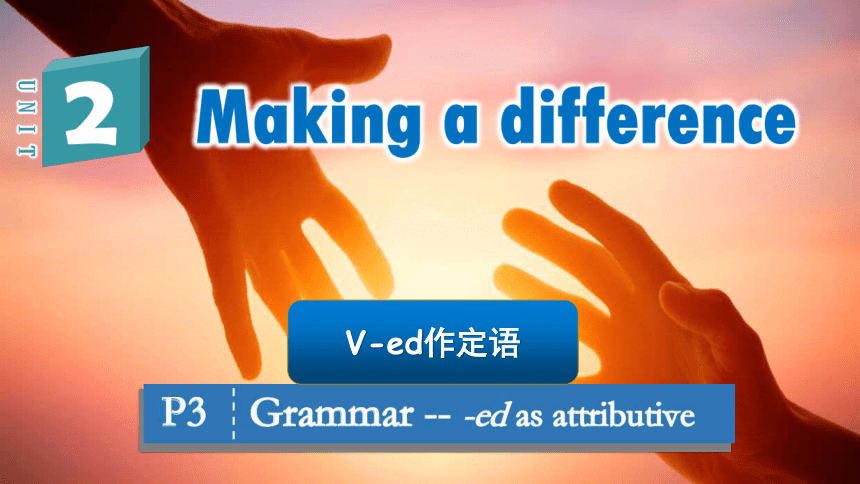
|
|
| 格式 | pptx | ||
| 文件大小 | 2.4MB | ||
| 资源类型 | 教案 | ||
| 版本资源 | 外研版(2019) | ||
| 科目 | 英语 | ||
| 更新时间 | 2024-07-25 20:40:54 | ||
图片预览

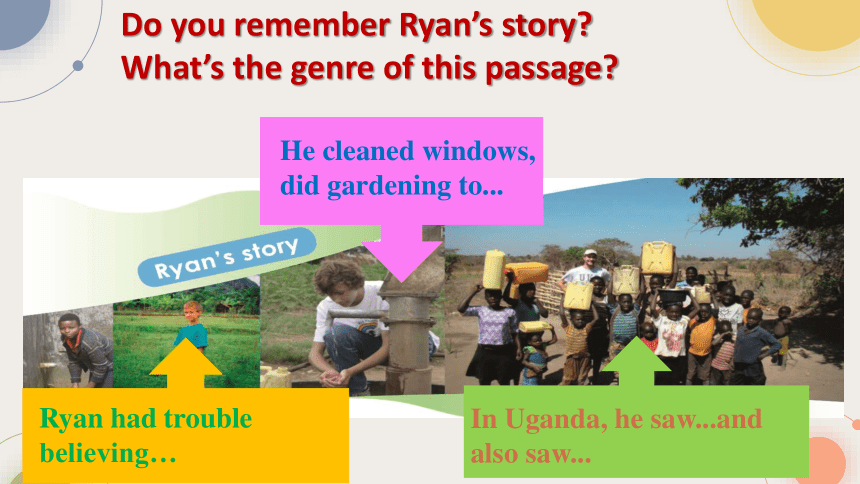
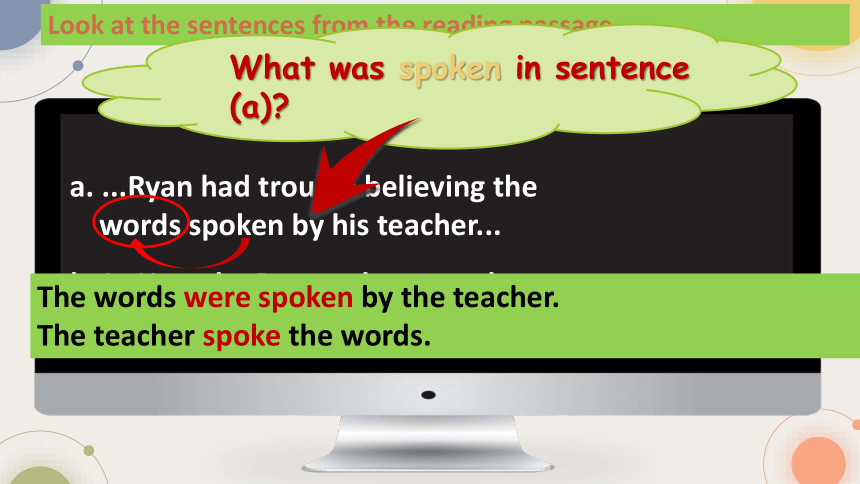
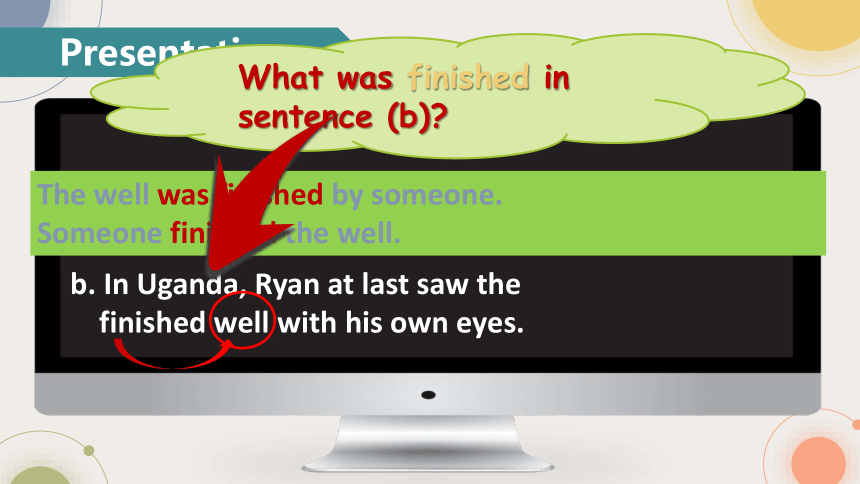

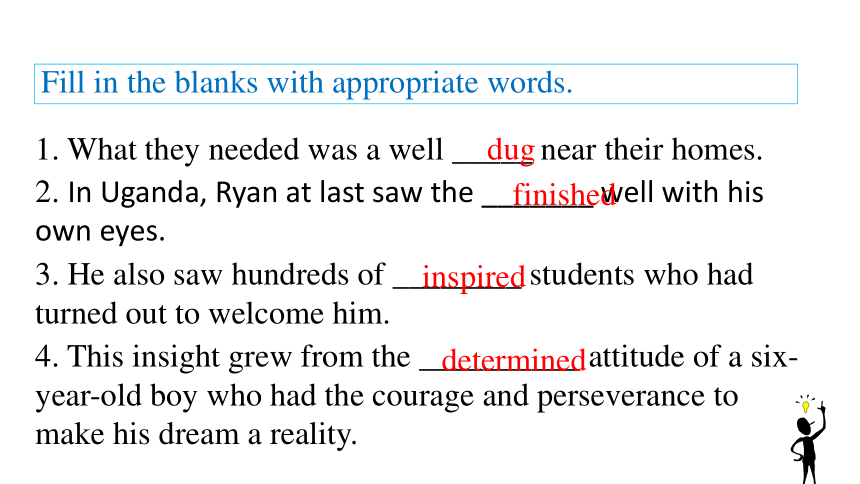
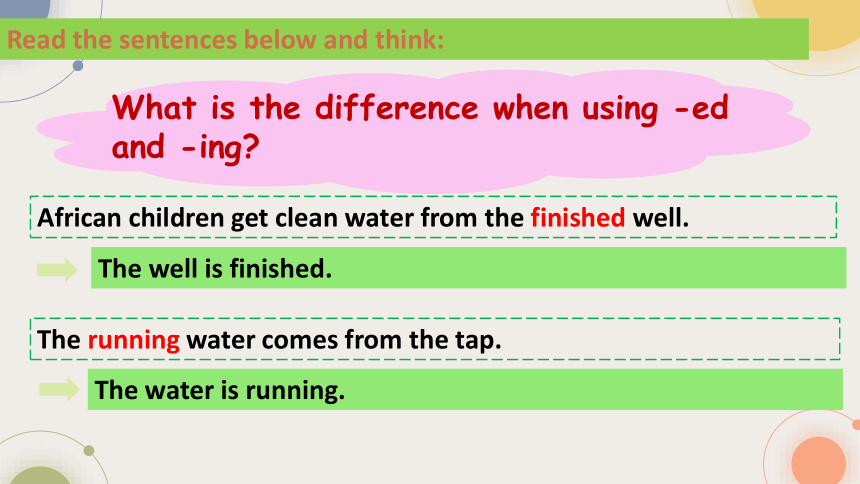
文档简介
(共18张PPT)
V-ed作定语
Do you remember Ryan’s story
What’s the genre of this passage
Ryan had trouble believing…
He cleaned windows, did gardening to...
In Uganda, he saw...and also saw...
Look at the sentences from the reading passage.
a. ...Ryan had trouble believing the
words spoken by his teacher...
b. In Uganda, Ryan at last saw the
finished well with his own eyes.
The words were spoken by the teacher.
The teacher spoke the words.
What was spoken in sentence (a)
Presentation
a. ...Ryan had trouble believing the
words spoken by his teacher...
b. In Uganda, Ryan at last saw the
finished well with his own eyes.
The well was finished by someone.
Someone finished the well.
What was finished in sentence (b)
1. What they needed was a well dug near their homes.
2. In Uganda, Ryan at last saw the finished well with his own eyes.
3. He also saw hundreds of delighted students who had turned out to welcome him.
4. This insight grew from the determined attitude of a six-year-old boy who had the courage and perseverance to make his dream a reality.
More examples from the text:
1. What they needed was a well _____ near their homes.
2. In Uganda, Ryan at last saw the _______ well with his own eyes.
3. He also saw hundreds of ________ students who had turned out to welcome him.
4. This insight grew from the __________ attitude of a six-year-old boy who had the courage and perseverance to make his dream a reality.
Fill in the blanks with appropriate words.
dug
finished
inspired
determined
Read the sentences below and think:
What is the difference when using -ed and -ing
African children get clean water from the finished well.
The running water comes from the tap.
The well is finished.
The water is running.
1. Watching the ________ (finish) painting, Alice couldn't help smiling.
2. Those guests _______ (seat) at the front row came from a European country.
3. The film _______ (base) on the novel by Moyan has got the first prize in the Oscar film festival.
4. The poor man __________ (wonder) on the road was out of work, helpless and hopeless.
5. The professor ______ (give) a speech about pollution now is from Harvard University.
finished
seated
based
wondering
giving
More examples:
过去分词作定语
-ed as attributive
一、过去分词作定语的意义:
1.及物动词的过去分词通常表示被动和完成。
I don‘t like the book written by Martin.
That is the bike repaired by Tom.
The fallen leaves of the wood cover the ground when in fall.
3. 过去分词(短语)作非限定性定语,相当于非限定性定语从句,用来补充说明被修饰词的情况,通常用逗号与主句隔开。
The bridge, built last year is in use now.
(=which was built last year)
2. 不及物动词的过去分词作定语仅表示完成,不表示被动。
二、过去分词作定语时的位置:
一般情况下,单个过去分词作前置定语,即放在被修饰词之前。
The polluted water was to blame for the spread of cholera.
There are two broken cups on the ground.
(
)
The river polluted by daily waste is now
dirty and smelly.
The old man supported by walking stick is our previous headmaster.
(
)
过去分词短语作定语时往往作后置定语,即放在被修饰词之后。
(
)
(
)
(1) The boy _______ (injure) in the accident was taken to hospital.
(2) Some of the people ________(invite) to the party can't come.
(3) Most of the goods ______ (make) in the factory are exported.
(4)The window ________ (break) in the storm has now been repaired.
(5) Have you finished the exercises ______ (give) by Mr. Li
More examples:
=who was injured
injured
=who were invited
invited
=which are made
made
=which was broken
which were given
broken
given
V-ing表主动、正在进行或经常性的动作;
V-ed 表被动、动作已经完成
V-ed作定语与V-ing作定语的区别:
the falling leaves
the fallen leaves
(正往下落的)
(已落到地面的)
boiling water
boiled water
(正在沸腾的)
(已经沸腾过的)
_________ (bark)dogs seldom bite. 会叫的狗不咬人。
A penny _____ (save) is a penny ______(earn). 省钱就是赚钱。
a developing country
a developed country
(发展中的)
(发达的)
Barking
saved
earned
1. Watching the ________ (finish) painting, Alice couldn't help smiling.
2. Those guests _______ (seat) at the front row came from a European country.
3. The film _______ (base) on the novel by Moyan has got the first prize in the Oscar film festival.
4. The poor man __________ (wonder) on the road was out of work, helpless and hopeless.
5. The professor ______ (give) a speech about pollution now is from Harvard University.
finished
seated
based
wondering
giving
More examples:
Read the discussion between two students about Ryan’s foundation. Rewrite the underlined sentences using the –ed form.
Practice
Ryan is a young man admired by a lot of people.
The money raised by his foundation supports schools and communities in Africa.
Practice
As in the words spoken by Ryan, we need to not only donate money but also get new ideas.
I think the needed support includes new technology for recycling water and education on how to use and save water.
Read the passage and choose the correct form of the words.
Production
The United Nations Children’s Fund, also knowing/ known as UNICEF, is a United Nations(UN) organisation basing/ based in New York. It offers help needing/needed by children all over the world. UNICEF was founded on 11 December 1946, to provide food and healthcare to children in countries damaging/ damaged in World War ll. Since 1953, UNICEF has taken up an extended mission to help children in the developing/ developed world, including those living/ lived with diseases or disabilities, and those affecting/ affected by rapid modernisation and environmental problems. Now, UNCEF has been working to improve the lives of children and their families across 190 countries and territories.
Read the passage and choose the correct form of the words.
Production
The United Nations Children’s Fund, also known as UNICEF, is a United Nations(UN) organisation based in New York. It offers help needed by children all over the world. UNICEF was founded on 11 December 1946, to provide food and healthcare to children in countries damaged in World War ll. Since 1953, UNICEF has taken up an extended mission to help children in the developing world, including those living with diseases or disabilities, and those affected by rapid modernisation and environmental problems. Now, UNCEF has been working to improve the lives of children and their families across 190 countries and territories.
V-ed作定语
Do you remember Ryan’s story
What’s the genre of this passage
Ryan had trouble believing…
He cleaned windows, did gardening to...
In Uganda, he saw...and also saw...
Look at the sentences from the reading passage.
a. ...Ryan had trouble believing the
words spoken by his teacher...
b. In Uganda, Ryan at last saw the
finished well with his own eyes.
The words were spoken by the teacher.
The teacher spoke the words.
What was spoken in sentence (a)
Presentation
a. ...Ryan had trouble believing the
words spoken by his teacher...
b. In Uganda, Ryan at last saw the
finished well with his own eyes.
The well was finished by someone.
Someone finished the well.
What was finished in sentence (b)
1. What they needed was a well dug near their homes.
2. In Uganda, Ryan at last saw the finished well with his own eyes.
3. He also saw hundreds of delighted students who had turned out to welcome him.
4. This insight grew from the determined attitude of a six-year-old boy who had the courage and perseverance to make his dream a reality.
More examples from the text:
1. What they needed was a well _____ near their homes.
2. In Uganda, Ryan at last saw the _______ well with his own eyes.
3. He also saw hundreds of ________ students who had turned out to welcome him.
4. This insight grew from the __________ attitude of a six-year-old boy who had the courage and perseverance to make his dream a reality.
Fill in the blanks with appropriate words.
dug
finished
inspired
determined
Read the sentences below and think:
What is the difference when using -ed and -ing
African children get clean water from the finished well.
The running water comes from the tap.
The well is finished.
The water is running.
1. Watching the ________ (finish) painting, Alice couldn't help smiling.
2. Those guests _______ (seat) at the front row came from a European country.
3. The film _______ (base) on the novel by Moyan has got the first prize in the Oscar film festival.
4. The poor man __________ (wonder) on the road was out of work, helpless and hopeless.
5. The professor ______ (give) a speech about pollution now is from Harvard University.
finished
seated
based
wondering
giving
More examples:
过去分词作定语
-ed as attributive
一、过去分词作定语的意义:
1.及物动词的过去分词通常表示被动和完成。
I don‘t like the book written by Martin.
That is the bike repaired by Tom.
The fallen leaves of the wood cover the ground when in fall.
3. 过去分词(短语)作非限定性定语,相当于非限定性定语从句,用来补充说明被修饰词的情况,通常用逗号与主句隔开。
The bridge, built last year is in use now.
(=which was built last year)
2. 不及物动词的过去分词作定语仅表示完成,不表示被动。
二、过去分词作定语时的位置:
一般情况下,单个过去分词作前置定语,即放在被修饰词之前。
The polluted water was to blame for the spread of cholera.
There are two broken cups on the ground.
(
)
The river polluted by daily waste is now
dirty and smelly.
The old man supported by walking stick is our previous headmaster.
(
)
过去分词短语作定语时往往作后置定语,即放在被修饰词之后。
(
)
(
)
(1) The boy _______ (injure) in the accident was taken to hospital.
(2) Some of the people ________(invite) to the party can't come.
(3) Most of the goods ______ (make) in the factory are exported.
(4)The window ________ (break) in the storm has now been repaired.
(5) Have you finished the exercises ______ (give) by Mr. Li
More examples:
=who was injured
injured
=who were invited
invited
=which are made
made
=which was broken
which were given
broken
given
V-ing表主动、正在进行或经常性的动作;
V-ed 表被动、动作已经完成
V-ed作定语与V-ing作定语的区别:
the falling leaves
the fallen leaves
(正往下落的)
(已落到地面的)
boiling water
boiled water
(正在沸腾的)
(已经沸腾过的)
_________ (bark)dogs seldom bite. 会叫的狗不咬人。
A penny _____ (save) is a penny ______(earn). 省钱就是赚钱。
a developing country
a developed country
(发展中的)
(发达的)
Barking
saved
earned
1. Watching the ________ (finish) painting, Alice couldn't help smiling.
2. Those guests _______ (seat) at the front row came from a European country.
3. The film _______ (base) on the novel by Moyan has got the first prize in the Oscar film festival.
4. The poor man __________ (wonder) on the road was out of work, helpless and hopeless.
5. The professor ______ (give) a speech about pollution now is from Harvard University.
finished
seated
based
wondering
giving
More examples:
Read the discussion between two students about Ryan’s foundation. Rewrite the underlined sentences using the –ed form.
Practice
Ryan is a young man admired by a lot of people.
The money raised by his foundation supports schools and communities in Africa.
Practice
As in the words spoken by Ryan, we need to not only donate money but also get new ideas.
I think the needed support includes new technology for recycling water and education on how to use and save water.
Read the passage and choose the correct form of the words.
Production
The United Nations Children’s Fund, also knowing/ known as UNICEF, is a United Nations(UN) organisation basing/ based in New York. It offers help needing/needed by children all over the world. UNICEF was founded on 11 December 1946, to provide food and healthcare to children in countries damaging/ damaged in World War ll. Since 1953, UNICEF has taken up an extended mission to help children in the developing/ developed world, including those living/ lived with diseases or disabilities, and those affecting/ affected by rapid modernisation and environmental problems. Now, UNCEF has been working to improve the lives of children and their families across 190 countries and territories.
Read the passage and choose the correct form of the words.
Production
The United Nations Children’s Fund, also known as UNICEF, is a United Nations(UN) organisation based in New York. It offers help needed by children all over the world. UNICEF was founded on 11 December 1946, to provide food and healthcare to children in countries damaged in World War ll. Since 1953, UNICEF has taken up an extended mission to help children in the developing world, including those living with diseases or disabilities, and those affected by rapid modernisation and environmental problems. Now, UNCEF has been working to improve the lives of children and their families across 190 countries and territories.
